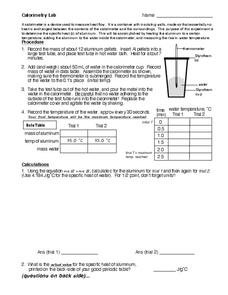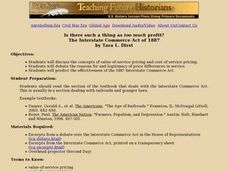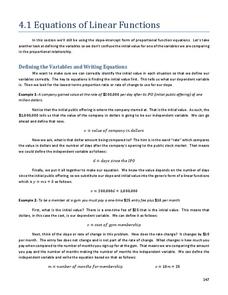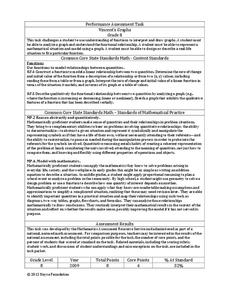Curated OER
“Self Reliance” Questions
Is consistency foolish? Or is “foolish consistency . . . the hobgoblin of little minds”? Ralph Waldo Emerson’s “Self Reliance” provides readers with an opportunity to reflect on their own musing about being self-reliant and about...
Hello-Hello
Spanish – Learn Spanish (Hello-Hello)
Pick up basic conversational Spanish with animated videos featuring three characters: Pablo, Ana, and Marcos. As Pablo and Marcos get to know Ana, they talk about a variety of subjects. Learners can acquire the vocabulary in each...
Curated OER
Calorimetry Lab
For this calorimetry lab, students apply the information read about a calorimeter to conduct a scientific investigation. Students record their data in a chart. Students use the information from the chart to calculate specific heat of...
Curated OER
Estimating Solutions to Word Problems
Fourth graders explore number sense by completing word problems in class. In this estimation activity, 4th graders define terms such as sum, difference, estimate and best. Students complete estimating worksheets based on the concept of...
Curated OER
Chaos and Fractal Applications
Eighth graders identify the different applications of fractals. In this math lesson, 8th graders use graphing calculator to solve algorithms. They explain how changing parameters and initial conditions affect the solutions.
Curated OER
Can Land Ethics Work?
Students evaluate the various purposes and issues surrounding the management of a nature preserve. They participate in discussion on whether there is intrinsic value in nature for its own sake.
Curated OER
Learning to Live Responsibly Within One's Personal Resources
Young scholars explore survival techniques in the light of their own values and personal situations. The differences between needs and wants and how consumerism effects the environment forms the main focus of this three lessons unit.
Curated OER
Growth and Decay
In this math worksheet, students compute the annual rate of appreciation or depreciation in a set of 7 problems. Each problem involves a given amount of money (or value) and indicates the percent of appreciation or depreciation.
Curated OER
Is there such a thing as too much profit?
Eleventh graders discuss the concepts of value-of-service pricing and cost-of service pricing. They debate the reasons for and legitimacy of price differences in service. # students predict the effectiveness of the 1887 Interstate...
Curated OER
Algebra I: A Draining Swimming Pool
Young scholars analyze and develop symbolic representations to describe the amount of water left in a pool being pumped out after a given amount of time, with various pumping rates and initial quantities of water in the pool.
Curated OER
Which Shall We Pick?
Young scholars compare and contrast the value of different organizations in their community. They listen to subjective and objective perspectives to make a decision. They use the decision-making process to decide which organization needs...
Curated OER
John Marshall House
Students examine the life of John Marshall, his house and his way of life. They analyze his values and how his private life affected his public life. They also examine historical sites that commemorate notable deeds.
Curated OER
A Mixed Bag of Apples
Middle schoolers recognize that individuals and groups have both common and different attributes and that each individual may be a member of many different groups. They recognize, appreciate and value individual differences and...
Curated OER
Cave Painting in the Ice Age
Students take notes and sketch during the Internet research. They take notes of the colors found in the cave paintings (black, browns, ochre, sienna). They create an initial full size comprehensive sketch on scrap paper and in their...
Curated OER
A Closer Look
Students observe an ordinary scene and look for elements of design, dynamics, spatial elements, and music. they then create their own everyday dance.
Curated OER
Applying Properties to Variables
Eighth graders combine like terms in this properties of variables lesson. Using named items (stars, moons and hearts), they combine like terms using variables. They use the distributive property to combine like terms. Finally, they write...
Curated OER
Population and Food Supply
What does it mean for something to grow exponentially, and how does that compare to linear growth? This activity tries to help learners gain an understanding of these concepts while modeling real-world problems. Linear and exponential...
Curated OER
Bar Graphs
Third graders examine the main parts of a bar graph and how to round up to the nearest tenth. They make an example of a bar graph and answer questions based on the graph using a list of state capitals and their average temperatures....
Charleston School District
Equations of Linear Functions
Teaching linear function relationships using contextual information is beneficial to pupils' understanding. The lesson uses problem solving to build linear functions given different information for each problem. This is the second...
BW Walch
Creating and Graphing Exponential Equations
Frequently found in biology and economic application problems, exponential equations show up as stars in this introductory presentation. Taking no background or knowledge of exponentials for granted, the slides walk learners...
Inside Mathematics
House Prices
Mortgages, payments, and wages correlate with each other. The short assessment presents scatter plots for young mathematicians to interpret. Class members interpret the scatter plots of price versus payment and wage versus payment for...
Inside Mathematics
Vencent's Graphs
I like algebra, but graphing is where I draw the line! Worksheet includes three multiple-part questions on interpreting and drawing line graphs. It focuses on the abstract where neither axis has numbers written in, though both are...
Charleston School District
Graphs of Linear Functions
What does a slope of 2/3 mean? Develop an understanding of the key features of a linear function. Pupils graph the linear functions and explain the meaning of the slope and intercepts of the graphs.
Mathematics Vision Project
Module 1: Sequences
Take steps into sequences. An 11-lesson unit builds upon pupils' previous understanding of writing expressions to develop the idea of sequences. The resource explores both arithmetic and geometric sequences using recursive and explicit...























